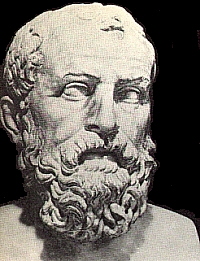 Largely credited for laying at least part of the foundations for the modern democratic country of Greece, Solon was a politician and poet who was prominent in Athens between 638 and 558 BC. As with many of his contemporaries, there is a dearth of documentary and archaeological evidence concerning the life of this Athenian statesman who remains an influential figure in our ancient history.
Largely credited for laying at least part of the foundations for the modern democratic country of Greece, Solon was a politician and poet who was prominent in Athens between 638 and 558 BC. As with many of his contemporaries, there is a dearth of documentary and archaeological evidence concerning the life of this Athenian statesman who remains an influential figure in our ancient history.
His poetry survives to today in fragments and provides an important insight to the life and times of Athens and Greece during this period. Solon was born in Athens around 638 BC to fairly noble parents with a lineage that stretched from the King of Athens to his contemporary Plato.
It is thought that early in life Solon went into commerce, considered a less than noble pursuit at the time, and is thought to have been given charge of the Athenian forces during a dispute over Salamis Island with Megara. Legend has it that the campaign was not going well but that Solon wrote a rousing poem that helped to turn things around. When the Megarans steadfastly refused to give up Salamis Island, the dispute was finally settled after the intervention of the Spartans who were swayed by Solon’s elegant argument and awarded the island to Athens.
Around 594 BC, Solon was some form of chief magistrate and brought in a number of wide reaching economic and moral reforms. When this was achieved he traveled abroad, for almost ten years, in order that his opponents couldn’t force him to repeal any of his new laws. He stayed for a while in Egypt where he explored philosophy with the priests there and then headed for Cyprus where he helped undertake the building of a new city.

Solon finally returned to Athens and promptly became a hardened opponent to Pisistratus who had once helped him secure Athenian ownership of Salamis Island. His protestations were in vain as Pisistratus went on to take power and would live to the ripe old age of 80.
Although he is often considered an unexceptional poet, Solon is the first Athenian writer whose work survives in fragments to this day. Whilst some of his verses are written obviously for pleasure, others show a militancy and have been written because of his role as a political activist at the time. His works produce an insight into the Athenian world at the time and is of more value as a historical document than for its literary merit.

Much of his poetry demonstrates a wish for moderation in a world where political polarization was on the increase as the pantheon of Ancient Greece was finally beginning to crumble. He produced some far reaching legislation for his time and his moral reforms included easing the burden on farmers that meant if their property failed they could be sold into slavery.
Solon was thought to be in his eighties when he finally died and his legacy is largely thought to have been the beginning democratic processes that many of us enjoy to this day.

